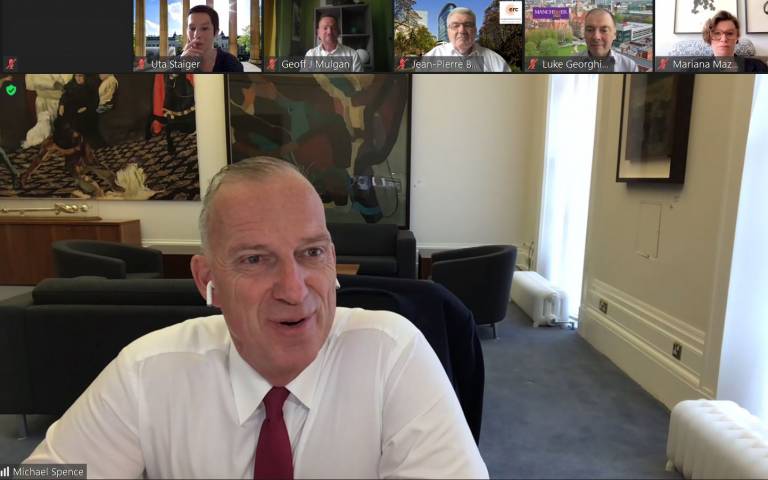UCL hosts European research leaders roundtable
20 July 2021
The UCL European Institute's latest roundtable brought together research leaders from across the UK and Europe for a discussion on shaping a constructive EU-UK research agenda.

On 15 July 2021, UCL President & Provost Dr Michael Spence hosted former European Commissioner for Research, Innovation and Science, Carlos Moedas, and research leaders from across the UK and continental Europe for a roundtable discussion ‘Shaping a Constructive EU-UK research agenda’.
The roundtable, convened by the UCL European Institute and chaired by UCL European Institute Executive Director and Pro-Vice-Provost for Europe, Dr Uta Staiger, provided the opportunity to exchange views on the challenges and opportunities facing European research, and the evolving EU-UK research relationship.
Discussions, which included participation from the Rectors of UCL strategic partner universities KU Leuven and ETH Zurich, underlined the importance of preserving research cooperation in the face of increasing geopolitical protectionism; the value of continued UK leadership in European science policy and governance; and the need to develop resilient pan-European collaborations.
Carlos Moedas, who is now a Visiting Professor at UCL European Institute, shared his reflections on developing the Horizon Europe programme, which outlines key “missions” to solve the pressing global challenges of climate, cancer, oceans, smart cities and soil health.
The group underlined how the Covid-19 pandemic has demonstrated both the value of science for society, and the fundamental importance of a globally open, collaborative scientific system. They identified the need for sustained advocacy on the benefits of UK association to Horizon Europe; continued influence for UK science in Brussels; and innovative models for mobilising UK, European and global scientists to tackle complex global challenges, like climate change.
Dr Spence said:
“This event was a timely opportunity to reflect on how UK and European research leaders can strengthen and maintain cooperation, post-Brexit. Discussions made clear our shared commitment to developing sustainable partnerships, as well as our responsibility to jointly advocate for the values of openness and international exchange across borders.”
Dr Staiger added:
“We were delighted to convene such an important discussion on the future of European research. There is a huge amount to be played for in strengthening collaborations and a great appetite that the UK remains a key part of European science and endeavour.”
The event will inform a programme of work in the EU-UK research area by the UCL European Institute and UCL Global Engagement during the academic year 2021/22.
 Close
Close

